Gerda: A Flame in Winter review
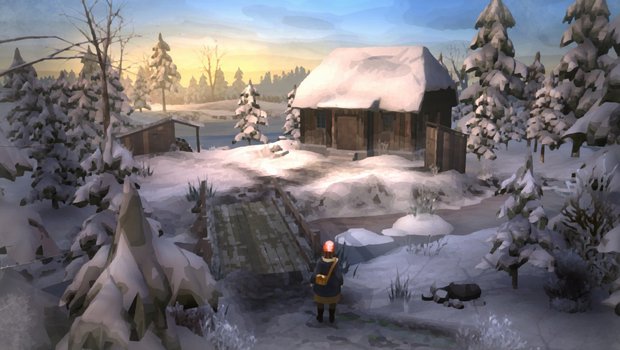
- 0 Comments
A great choice for WWI-themed narrative drama
On April 9, 1940, Nazi Germany overwhelmed Denmark’s army and began their occupation of their Northern neighbors that would last for the duration of the war. This occupation represented a marked change from the shared history between the two countries going back thousands of years, especially in the border region, an area referred to as Southern Jutland. People of Danish and German descent lived and worked amongst each other in relative peace, though this peace would be upended when a hyper-nationalistic, fascist government came to rule. For the first time, trust between the two nationalities was tested and pulled to a breaking point. It’s a dark but intriguing real-world backdrop for a game, and Gerda: A Flame in Winter builds on this setting to craft a heart-wrenching narrative adventure about the bravery of citizens during wartime.
Gerda is set in February 1945, six months before what would come to be known as Victory in Europe Day in Denmark. The eponymous young heroine and her husband Anders have survived the first six years of the war unscathed from the violence that has plagued much of the world, and have been largely able to go about their lives. The same can be said for most of the villagers of her town, both her Dutch and German counterparts. Things change dramatically, however, when Gerda returns home one night from her job as a nurse to find Gestapo officers beating and interrogating Anders, whom they accuse of bombing a local factory and being a member of the resistance. Anders is taken away, throwing Gerda headfirst into the conflict she tried so hard to avoid.
The remainder of the game tasks you with guiding Gerda in forming relationships that she hopes will help her rescue her husband from captivity. To do this, she must navigate her way through four different factions. There are the normal Danish and German citizens, the Occupation (Nazis), and the Danish rebels. By choosing different dialog options or by completing actions that either favor or go against a particular faction, you will be awarded or penalized points. You can gain or lose points for a faction even if there is no one in the faction around, which makes it hard to try to both-sides your way through. If you’re speaking with a Nazi officer and even pretend to agree with them, you could very well lose a point with the resistance and Danish citizens. This can be a bit frustrating, because people living through such circumstances would have surely had to lie their way through some situations in order to survive, but it does not happen enough to be a deal-breaker here.
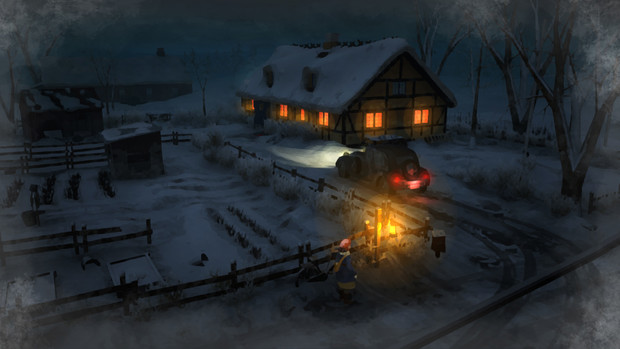
Gerda is light on actual gameplay but par for the course for a narrative-driven adventure. Viewed from an isometric perspective, the game is divided into days, each day further split into smaller scenes in which Gerda is free to explore her surroundings and chat with other characters. She will visit places like an open-air market, a doctor’s office, and the Gestapo headquarters. At the end of each day, there’s a brief interlude with Gerda writing her thoughts and observations in her journal about what has transpired during the previous 24 hours. During these segments, you choose one of three statements that she will add to the journal. Each choice corresponds with an attribute (compassion, insight, wit) and you will gain a point in that attribute depending on what you pick.
You can then use these points during gameplay to get a more favorable outcome during a conversation or achieve success in completing an action. If you don’t have enough points in a particular attribute, the dialog option will be greyed out. Once you use a point, it’s gone, so there is a bit of strategy involved. You might be able to spend one in compassion to stop a Gestapo officer from beating a citizen by appealing to their humanity, or you can spend a point in insight to help convince someone to take your side or assist you in furthering your goals. It adds a welcome roleplaying aspect that makes the experience more than a “walk here talk to this person, walk there to talk to that person” affair.
Controls are basic, the bulk of which involve either the movement keys to walk around or the control stick to navigate using a gamepad, which is the preferred way to play (I played on the Steam Deck and it ran great). The game uses a fixed camera view, so you cannot adjust the camera to change your orientation. As Gerda walks around the landscape, she will encounter hotspots that she can interact with. You won’t have to worry about pixel hunting or pressing a button to highlight these items, as they will show automatically from a fair distance away. These hotspots can lead to observations that will open dialog choices with characters later on. They could also be items you can pick up to use later, but there is no typical inventory management. If an item is applicable during a conversation, you will be able to use it by choosing that option. If you do not have the item, that choice will be greyed out so you will know you missed something.
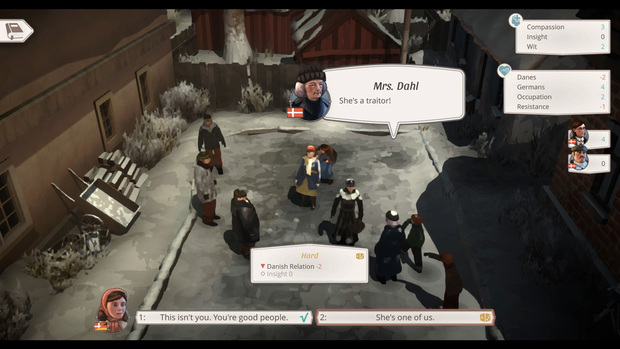
There is usually no limit to how many of these hotspots you can look at, pick up, etc., but that is not always the case. There will be times when a bar at the top of the screen denotes how long Gerda has before she is forced to move on, and with each interaction she performs the bar will deplete a bit more. These usually happen during high-pressure moments. In the climactic scene, a train is scheduled to leave the station shortly and Gerda can only complete a few of the many actions available before it departs, so you must choose how to spend her time wisely. The game uses an autosave feature and does not allow you to manually record your progress, so you’ll have to live with your decisions.
The art style and soundtrack in Gerda are simple yet interesting. The game looks like a moving watercolor painting where you can see the brush strokes, as if the landscapes have been pulled from a painting. It gives the aesthetic a dream-like style that seems fitting for a place where characters have been trapped in a state of arrested development for the past five-plus years in a sort of nightmare-like limbo. It’s very effective. A lone piano makes up the bulk of the wistful score that also adds to the ambiance. The game does not feature voice acting during actual gameplay, only between days when Gerda reads from her diary.
As you’d imagine from its subject matter, Gerda is a heavy game, and a dramatic one taken from one of the ugliest eras in all of human history. The developers have wisely grounded it by focusing on the helpless civilian casualties in a small, contained setting while also keeping the specter of the greater conflict looming in the background. You aren’t sheltering from air raids or barricading yourself from attacks, but you feel the dread and hopelessness with each stroke of a piano key and each footprint Gerda makes in the snow as she desperately goes about trying to save her husband. It’s not easy to empathize with her, as most of us have thankfully never been in her shoes, but it’s easy to sympathize with her and her quest.
There are also some heavy decisions to make, and at times Gerda has the choice to side with Nazis over the other factions. At one point she can choose to help a Gestapo officer by lying to his superior, in return for his promise to look more favorably at her incarcerated husband. I could not bring myself to do that, knowing I was simply playing a game, but that was a luxury that real people living under the Nazi occupation must have wrestled with deeply. While the game does not delve into the Holocaust too much, there are two Jewish characters who you can have Gerda help, but the lengths to which you’re willing to do so may impact the fates of others. Such decisions are pretty gut-wrenching and not something normally addressed in video games.
The ending I got tied up all the loose ends in a satisfying way. Purportedly there are a few different outcomes that determine whether certain major characters live or die, but I was not able to get one that was drastically different when I went back for another playthrough. It wasn’t clear what I needed to do differently, and siding with the Nazis was not an option I wanted to pursue even then. The replay system is convenient in the sense that you are given the choice to start from scratch or choose a specific day and go from there, and it’s fairly easy to do a speed run by skipping dialog and any non-essential exploration. The game is not long, maybe five to six hours the first time through, which you could probably knock down to three once you know what to do, so it’s not too daunting even if you’d like to start from scratch.
Final Verdict
World War II games generally skew heavily toward telling hyper violent tales from a soldier’s perspective. Whether in the forests of the Ardennes during the Battle of the Bulge, or amongst the ruins of Stalingrad and the Eastern Front, the main concern is usually staying behind cover and getting as many headshots as you can. Not a lot of attention has been given to the experiences of ordinary citizens trying to cope with the horrors of occupation by living their lives as best they can, and this is what makes Gerda: A Flame in Winter stand out. It lacks much in the way of gameplay, but it does not lack for tension throughout. The story is a deeply personal one that relies on choices rather than gunfire, and should not be missed by any fan of narrative-driven dramas.
Hot take
A haunting story that is likely to stay with you for some time after finishing, Gerda: A Flame in Winter rises above its simplistic gameplay to tell a poignant, personal choice-driven tale and shed light on some of the forgotten heroes of World War II.
Pros
- Well-written story with deep characters
- Rarely explored WWII subject matter that focuses on civilian struggles during occupation
- Intriguing art style, like a moving watercolor painting
Cons
- Faction point system too rigidly implemented
- Unclear on what choices will lead to substantial changes during replay
Tom played Gerda: A Flame in Winter on PC using a review code provided by the game's publisher.

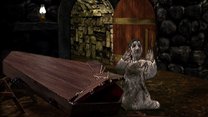


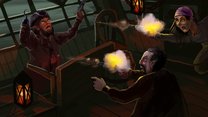




0 Comments
Want to join the discussion? Leave a comment as guest, sign in or register in our forums.
Leave a comment